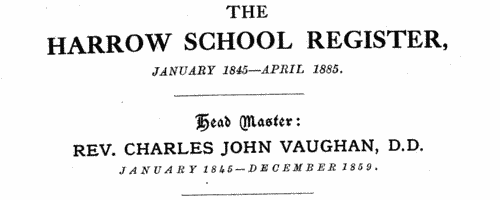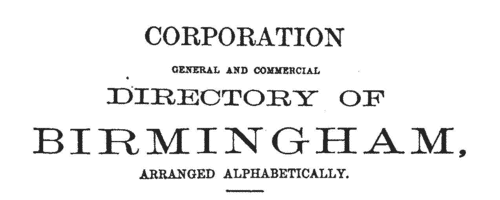Wilks Surname Ancestry ResultsOur indexes 1000-1999 include entries for the spelling 'wilks'. In the period you have requested, we have the following 708 records (displaying 461 to 470): Single Surname Subscription | | | Buying all 708 results of this search individually would cost £4,160.00. But you can have free access to all 708 records for a year, to view, to save and print, for £100. Save £4,060.00. More... |
These sample scans are from the original record. You will get scans of the full pages or articles where the surname you searched for has been found. Your web browser may prevent the sample windows from opening; in this case please change your browser settings to allow pop-up windows from this site.  British infantry fighting in China
(1860) British infantry fighting in China
(1860)
The China Medal was awarded to soldiers and sailors who took part in the prosecution of the war against the Chinese from 1856 to 1860. Separate clasps were awarded for men who had been in receipt of the China Medal of 1842; for being actually present at Canton on 28 and 29 December 1857, when that city was bombarded and finally captured; for being actually engaged in the operations which ceased with the first capture of the Taku Forts, 20 May 1858, and led to the Treaty of Tientsin; for being actually present at the capture of the Taku Forts 21 August 1860; and for being actually present before Pekin the day the gate of that city was given up to the allied (British and French) army, viz. on 13 October 1860. The 44th (The East Essex) Regiment of Foot, based at Colchester, having returned from the Crimea, embarked for India 26 August 1857, and was transferred thence to China. The regiment took part in the capture of the Taku Forts.WILKS. Cost: £8.00.  | Sample scan, click to enlarge

|  British riflemen fighting in China
(1860) British riflemen fighting in China
(1860)
The China Medal was awarded to soldiers and sailors who took part in the prosecution of the war against the Chinese from 1856 to 1860. Separate clasps were awarded for men who had been in receipt of the China Medal of 1842; for being actually present at Canton on 28 and 29 December 1857, when that city was bombarded and finally captured; for being actually engaged in the operations which ceased with the first capture of the Taku Forts, 20 May 1858, and led to the Treaty of Tientsin; for being actually present at the capture of the Taku Forts 21 August 1860; and for being actually present before Pekin the day the gate of that city was given up to the allied (British and French) army, viz. on 13 October 1860. The 2nd battalion, the 60th (The King's Royal Rifle Corps) Regiment, based in Winchester, embarked for the Cape of Good Hope in June 1851, and after taking part in the Kaffir War, was moved to India, where it helped deal with the Mutiny. In 1860 the battalion was transferred to China. The regiment took part in the capture of the Taku Forts and that of Pekin.WILKS. Cost: £8.00.  | Sample scan, click to enlarge

| Boys entering Harrow School
(1861)
This First Volume of the Second Series of the Harrow School Register was edited by J. H. Stogdon and published in 1925. The boys are listed by term of entrance, and then alphabetically by surname and christian names (in bold). Next, in brackets and in italics, is the school house to which he belonged - or, H. B. indicating a day boy whose family lived in Harrow. Stogdon then gives the father's surname and initials, and address. In cases where the boy was prominent in sports at school, or won academic prizes, scholarships &c., that is given; then the year of leaving the school; and a synopsis of his career, so far as known.
WILKS. Cost: £4.00.  | Sample scan, click to enlarge

| Long-stay Paupers in Workhouses: Cheltenham
(1861)
This comprehensive return by the Poor Law Board for England and Wales in July 1861 revealed that of the 67,800 paupers aged 16 or over, exclusive of vagrants, then in the Board's workhouses, 14,216 (6,569 men, 7,647 women) had been inmates for a continuous period of five years and upwards. The return lists all these long-stay inmates from each of the 626 workhouses that had been existence for five years and more, giving full name; the amount of time that each had been in the workhouse (years and months); the reason assigned why the pauper in each case was unable to sustain himself or herself; and whether or not the pauper had been brought up in a district or workhouse school (very few had). The commonest reasons given for this long stay in the workhouse were: old age and infirm (3,331); infirm (2,565); idiot (1,565); weak mind (1,026); imbecile (997); and illness (493). WILKS. Cost: £6.00.  | Sample scan, click to enlarge

| Long-stay Paupers in Workhouses: Stepney
(1861)
This comprehensive return by the Poor Law Board for England and Wales in July 1861 revealed that of the 67,800 paupers aged 16 or over, exclusive of vagrants, then in the Board's workhouses, 14,216 (6,569 men, 7,647 women) had been inmates for a continuous period of five years and upwards. The return lists all these long-stay inmates from each of the 626 workhouses that had been existence for five years and more, giving full name; the amount of time that each had been in the workhouse (years and months); the reason assigned why the pauper in each case was unable to sustain himself or herself; and whether or not the pauper had been brought up in a district or workhouse school (very few had). The commonest reasons given for this long stay in the workhouse were: old age and infirm (3,331); infirm (2,565); idiot (1,565); weak mind (1,026); imbecile (997); and illness (493). WILKS. Cost: £6.00.  | Sample scan, click to enlarge

| Long-stay Paupers in Workhouses: Tenbury
(1861)
This comprehensive return by the Poor Law Board for England and Wales in July 1861 revealed that of the 67,800 paupers aged 16 or over, exclusive of vagrants, then in the Board's workhouses, 14,216 (6,569 men, 7,647 women) had been inmates for a continuous period of five years and upwards. The return lists all these long-stay inmates from each of the 626 workhouses that had been existence for five years and more, giving full name; the amount of time that each had been in the workhouse (years and months); the reason assigned why the pauper in each case was unable to sustain himself or herself; and whether or not the pauper had been brought up in a district or workhouse school (very few had). The commonest reasons given for this long stay in the workhouse were: old age and infirm (3,331); infirm (2,565); idiot (1,565); weak mind (1,026); imbecile (997); and illness (493). WILKS. Cost: £6.00.  | Sample scan, click to enlarge

| Long-stay Paupers in Workhouses: West Derby (Lancashire)
(1861)
This comprehensive return by the Poor Law Board for England and Wales in July 1861 revealed that of the 67,800 paupers aged 16 or over, exclusive of vagrants, then in the Board's workhouses, 14,216 (6,569 men, 7,647 women) had been inmates for a continuous period of five years and upwards. The return lists all these long-stay inmates from each of the 626 workhouses that had been existence for five years and more, giving full name; the amount of time that each had been in the workhouse (years and months); the reason assigned why the pauper in each case was unable to sustain himself or herself; and whether or not the pauper had been brought up in a district or workhouse school (very few had). The commonest reasons given for this long stay in the workhouse were: old age and infirm (3,331); infirm (2,565); idiot (1,565); weak mind (1,026); imbecile (997); and illness (493). WILKS. Cost: £6.00.  | Sample scan, click to enlarge

| Residents and Traders in Birmingham
(1861)
William Cornish's Corporation General and Trades Directory covered Birmingham, Coventry and the towns of the Black Country. The Birmingham section contains both street lists and this general alphabetical directory. WILKS. Cost: £4.00.  | Sample scan, click to enlarge

| Tabular record of Wesleyan mortality
(1861)
The Christian Miscellany and Family Visiter, a Wesleyan Methodist monthly published in London, carried, in most issues, a Tabular Record of Mortality, listing recent deaths. The columns of the table are: Name, Residence, [Methodist] Circuit, Age, and Date of Death.WILKS. Cost: £6.00.  | Sample scan, click to enlarge

| Deaths, Marriages, News and Promotions
(1862)
Death notices and obituaries, marriage and birth notices, civil and military promotions, clerical preferments and domestic occurrences, as reported in the Gentleman's Magazine. Mostly from England and Wales, but items from Ireland, Scotland and abroad. July to December 1862WILKS. Cost: £4.00.  | Sample scan, click to enlarge

|
Research your ancestry, family history, genealogy and one-name study by direct access to original records and archives indexed by surname.
|













